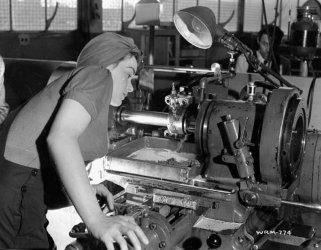You are using an out of date browser. It may not display this or other websites correctly.
You should upgrade or use an alternative browser.
You should upgrade or use an alternative browser.
Lee Enfield Long Branch No. 4 Mk1*... but all LE's seem to be disappearing as a surplus rifle you can buy?
- Thread starter Jäger1
- Start date
I have four Lee Enfields, a 1918 No.1 Mk III* (refurbished WWII), a 1942 Lithgow No.1 Mk III*, No.4 Mk 1/2 (refurbished 1954) and an unfired No.4 Mk2 from 1955. I also have a good supply of Greek HXP surplus ammo and some German (MEN) from the 1980's. I reload the .303 British. I love the SMLE. Next to the M1 Garand, it was the best battle rifle in two World Wars.
That still persists. The vast majority of the "excess headspace problem" of the Lee Enfield rifles primarily exists between the ears of American reloader's heads (and with more than a few gun writers that were just as uninformed to fuel the flames).At the time, in the US there was also a lot of negative feelings about the .303 being a poor choice to reload because of the rimmed design and the cases stretching making reloading a 2 or 3 time case before discarding the brass.
In general, Lee Enfields are no harder to reload for than any other rifle/caliber, and unless you're doing it wrong, the brass you use in your rifle should last just as long as brass used in other centerfire rifles. And if you're only getting 2 or 3 reloads out of it, you're DEFINITELY doing it wrong.
That's all pretty correct. Distribucorp in Quebec was selling them 1950 Long Branches of 93L and 95L serial numbers for $150, in cosmoline with hang tags attached as long as you bought a crate (10). I had spending money after just getting home from a deployment and bought a crate. Scrupulously cleaned all of them, taking care not to destroy the hang tags, mounted a Leopold 20x scope in a no-drill amount, then five five shots warming and ten shots for group at 300 yards using Greek HXP ball.I bought several of the Long Branch No.4's that were new in the grease when they hit the market. The story was they were found in a NATO warehouse in Belgium and all 1950 dated, black walnut stocked, nicely blued, and made for the Korean conflict. Cleaning the cosmoline out of them was a PITA, but OMG, what lovely rifles!
The rifle shown in the original post of this thread is one of the two.
Kept the two best grouping ones with that Mk VII ball for myself, and made a huge profit by selling the rest for $175 each.... oh, if I could only have them back, hang tags and all.
I don't buy the story they were for the Korean War, however. It seems they were in Belgium, but I think it's more likely they were being held as war stores - Belgium was already manufacturing the FN49 and shortly about to begin manufacturing the FN FAL. I don't think they were desperate for Lee Enfields for Korea.
You might like this documentary on Long Branch:
In 1963 you could buy them mail-order for $14…. but a K98 was only $11 so that's what I got for my 14th birthday. (I also preferred the "cock on opening" action.) Surplus Ammo was a nickel/round for either at a local AN-Surplus store in Houston. 8mm Lebel was 1-cent/rd. 30-wt motor oil for my'62 Falcon was 8-cents/qt. But a $100/wk was all an electrician's helper could make if he also worked Sat for overtime.
"Alle ist relatif", said the old Bavarian.
"Alle ist relatif", said the old Bavarian.
Interesting video, Thanks for sharing. (I'm surprised that such promotional material was contemporaneously produced/shared about war-production.)
I have a Sten Mk II marked "Long Branch 1944" on the top-side of the magazine-well, but on the underside is stamped with 3-lines of Chinese Hanzi which were interpreted for me by a visitor to describe the weapon. It was apparently one of a large number intended to supply Chinese Nationalists, partisans and militia against Japanese invaders. According to Google:
"Sten guns were supplied to China during World War II, primarily by Canada through the Mutual Aid Board. Specifically, the Long Branch arsenal in Canada produced and supplied approximately 73,000 Sten MkII submachine guns to the Chinese Nationalist forces to aid their fight against Japan. These Stens were standard MkII pattern guns chambered for the 9x19mm Parabellum cartridge."
I have a Sten Mk II marked "Long Branch 1944" on the top-side of the magazine-well, but on the underside is stamped with 3-lines of Chinese Hanzi which were interpreted for me by a visitor to describe the weapon. It was apparently one of a large number intended to supply Chinese Nationalists, partisans and militia against Japanese invaders. According to Google:
"Sten guns were supplied to China during World War II, primarily by Canada through the Mutual Aid Board. Specifically, the Long Branch arsenal in Canada produced and supplied approximately 73,000 Sten MkII submachine guns to the Chinese Nationalist forces to aid their fight against Japan. These Stens were standard MkII pattern guns chambered for the 9x19mm Parabellum cartridge."
Interesting video, Thanks for sharing. (I'm surprised that such promotional material was contemporaneously produced/shared about war-production.)
I'd have to watch again, but if my memory is correct the video was put together by a former worker after the war. The War Office probably shot various amounts of footage in the arsenals and aircraft manufacturers, and then censors and intelligence types decided which bits of footage could be put together to create bits of footage to feed the patriotism and the people at home.
The story of Small Arms Limited/Long Branch from it's beginnings until it closed/morphed into something else after manufacturing Canada's C1 and C2 FN FALs is in interesting one. I can't for the life of me remember if they manufactured Canada's version of the Sterling submachine gun that served Canada throughout the Cold War and up until 1985 when the Small Arms Replacement Project replaced all the infantry small arms except for the Inglis pistol.
Perhaps this is your Sten being assembled at Long Branch. Not all Canadians of Asian extraction found themselves interned in camps for the duration of the war while the government stole pretty much what they couldn't fit into a suitcase before leaving for those camps.
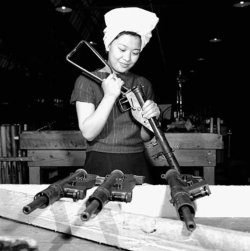
The FN P35 (again, if my memory is correct) was originally manufactured for the Chinese by Inglis (famous maker of Canadian washing machines and stoves) including the original tangent sight. It was only after that when it was produced in the form that armed the Canadians, Brits, etc for WWII and up until just a couple of years ago. Which is why the decal Inglis put on those High Powers has Chinese characters on it.I have a Sten Mk II marked "Long Branch 1944" on the top-side of the magazine-well, but on the underside is stamped with 3-lines of Chinese Hanzi which were interpreted for me by a visitor to describe the weapon. It was apparently one of a large number intended to supply Chinese Nationalists, partisans and militia against Japanese invaders.
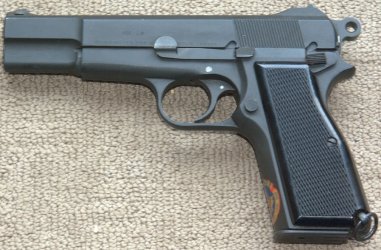

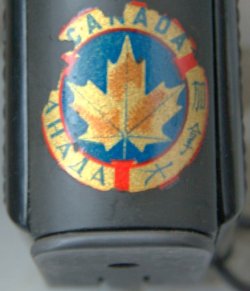
While Long Branch was stamping out those Sten guns, their barrel making division were also making barrels for their neighbors a few blocks away over at Inglis to put on their Bren guns (and possibly P35 pistols), where "Ronnie The Bren Gun Girl" was helping to sell war bonds years before the US was dragged for a second time from isolationism into WWII and copied Ronnie with "Rosie The Riveter".
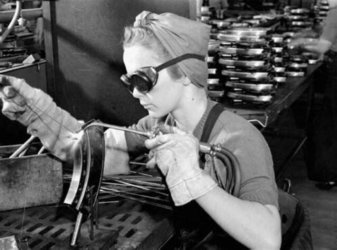
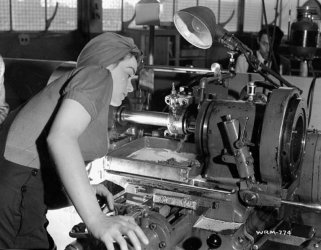
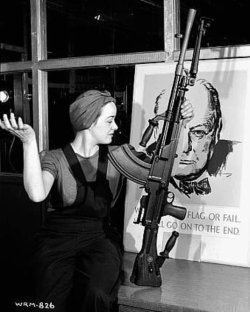
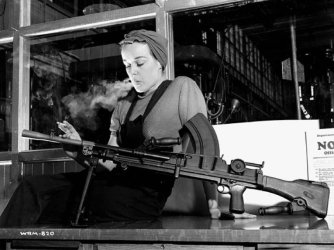
Some Long Branch No. 4 rifles were mounted with six groove Bren gun barrels, such rifles are now expensive collector rifles to that group of owners. I kind of looked for one because the story is that those barrels produced slightly better grouping ability than the five groove barrels. Never found one in good enough condition and with a price tag I was willing to pay. Besides, the guys winning Service Rifle matches were doing just fine with five groove barrels.
Attachments
Last edited:
Wonderful Post!I'd have to watch again, but if my memory is correct the video was put together by a former worker after the war. The War Office probably shot various amounts of footage in the arsenals and aircraft manufacturers, and then censors and intelligence types decided which bits of footage could be put together to create bits of footage to feed the patriotism and the people at home.
The story of Small Arms Limited/Long Branch from it's beginnings until it closed/morphed into something else after manufacturing Canada's C1 and C2 FN FALs is in interesting one. I can't for the life of me remember if they manufactured Canada's version of the Sterling submachine gun that served Canada throughout the Cold War and up until 1985 when the Small Arms Replacement Project replaced all the infantry small arms except for the Inglis pistol.
Perhaps this is your Sterling being assembled at Long Branch. Not all Canadians of Asian extraction found themselves interned in camps for the duration of the war while the government stole pretty much what they couldn't fit into a suitcase before leaving for those camps.
View attachment 763381
The FN P35 (again, if my memory is correct) was originally manufactured for the Chinese by Inglis (famous maker of Canadian washing machines and stoves) including the original tangent sight. It was only after that when it was produced in the form that armed the Canadians, Brits, etc for WWII and up until just a couple of years ago. Which is why the decal Inglis put on those High Powers has Chinese characters on it.
View attachment 763374
View attachment 763373
View attachment 763375
While Long Branch was stamping out those Sten guns, their barrel making division were also making barrels for their neighbors a few blocks away over at Inglis to put on their Bren guns (and possibly P35 pistols), where "Ronnie The Bren Gun Girl" was helping to sell war bonds years before the US was dragged for a second time from isolationism into WWII and copied Ronnie with "Rosie The Riveter".
View attachment 763382
View attachment 763385
View attachment 763386
View attachment 763387
Some Long Branch No. 4 rifles were mounted with six groove Bren gun barrels, such rifles are now expensive collector rifles to that group of owners. I kind of looked for one because the story is that those barrels produced slightly better grouping ability than the five groove barrels. Never found one in good enough condition and with a price tag I was willing to pay. Besides, the guys winning Service Rifle matches were doing just fine with five groove barrels.
(I think you mean my "STEN" not Sterling…but, Yes… good points.)
My family had neighbors (whose son was my fellow-Boy Scout patrol-member) who were CA-born American citizens …who were forced out of their Los Angeles home which was lost and occupied by looters and lost 800-yr old family antiques which were confiscated and/or stolen by looters after they were hauled away in Army busses. (They still were held responsible for the mortgage on that home however.)
Mrs. Sutow became a U.S. Army truck-driver in UT, while Dr. Sutow was interned at a separate camp to become the camp doctor AS WELL as the local village doctor. After the war they moved to Houston where as a cancer researcher at M.D. Anderson he developed a cure for a particular type of pediatric cancer.
My friend, their son, "Buzzy" (actually Edmund) in the 1980's became a state-dept diplomat to Mexico, and their daughter an attorney for the Atty-Gen's office. The entire Sutow family were modest, kindly, and generous. They quietly refused the measly $20K restitution offered by the gov't in the 1980s.
Dr. Sutow succumbed to radiation-poisoning, likely acquired when he made annual missionary-trips to attend to atom-bomb victims and their descendants. Mrs. Sutow died in the late 90's, still hosting exchange-students attending the U of H. (the Suzuki family were frequent visitors as well.)
I had a Type 94 pistol and holster, the flap of which contained Kanji she interpreted for me. I believe she "softened" the wording of the "prayer for protection" to the owner of that combo to protect my sensitivities, but she and the Dr. were loyal and true Americans.
We would do well to remember that our gov't is still capable even in these times of such mistreatment of denigrated people…. citizens included.
The things you never knew - and were never mentioned in school during the 1960's and 70's. Maybe not even in the 1980's, when I was long gone from High School. There were former internment camps only about a hundred miles away and a trip over the Redding Creek Pass that I never knew existed. There's so many personal stories and histories that branch out of that. Dodson Mah's is one of them.Wonderful Post!
(I think you mean my "STEN" not Sterling…but, Yes… good points.)
My family had neighbors (whose son was my fellow-Boy Scout patrol-member) who were CA-born American citizens …who were forced out of their Los Angeles home which was lost and occupied by looters and lost 800-yr old family antiques which were confiscated and/or stolen by looters after they were hauled away in Army busses.
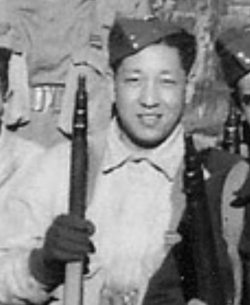
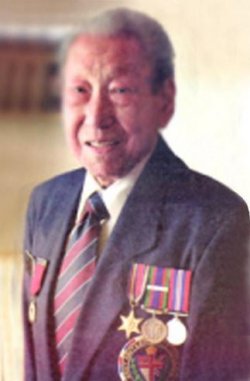
The first I heard of it was on a trip to see the bright lights of Vancouver for the first time with a guy who was a friend from work. We stayed with a friend of his, whose name I still remember although I never met him again, Dave Sakamoto. While driving somewhere around Richmond, he was pointing out all these rich lands next to YVR and casually saying "My Dad owned and farmed that before the war, and that block there as well", etc. We had just had lunch with his parents as my friend knew Dave's parents as well - they lived in a very humble small home in Steveston no bigger than the small home my Dad built and grew up in. Very nice welcoming people, pretty much like my own folks - definitely not well off from selling large tracts of property in the Lower Mainland.
When I said something like "What are you talking about?", that's when I first heard of the internment, seizure of homes and fishing boats, etc. I was having a hard time wrapping my head around that.
About ten years later, I was working drugs and paired up with a Customs Officer named Dodson Mah whose pictures are at the top, as we went through incoming cans at the terminals in Vancouver. Dodson was an irascible, chain smoking guy with an incredible sense of humor.
He casually told me one day after I told him about how I'd done with my Lee Enfield in a Service Rifle match,that a few years before he had heard noises downstairs in his home at night, got up and saw a couple of guys down in his living room. He promptly fired two shots at them out of his Lee Enfield, and was pissed off to see he'd missed and shot out his living room picture window. Followed by the neighbor's lights coming on, them coming to the door to ask if everyone was okay, and VPD showing up afterwards. When I asked him how he got out of that he broke into a sing-song broken English explanation and said the VPD finally gave up trying to understand this ugly old Asian, never even asking him where the gun was.
Dodson and his brother's parents were biracial, Chinese and Japanese; both of his parents had been born in Canada and then later married. Dodson said he spoke Cantonese, but only a little bit of Japanese. Being half Japanese was good enough to get them moved to one of the internment camps. Prior to that, probably being your usual 19 year old Alpha males, they had attempted to enlist after Canada went to war in 1939, but the Canadian military didn't want any Asians, didn't matter whether they saw them as Chinese or Japanese. So then the war with Japan started and now they weren't even free at home; they were in an internment camp.
Then the Brits and Canada came up with the idea of a Chinese Canadian commando group that they would parachute in back behind Japanese lines to link up with Dyak headhunters and other groups, and presumably convince them to kill Japanese instead of them on the spot. They named it Force 136, and probably 99% of Chinese Canadians have never heard of it, never mind the rest of Canada or people in other allied countries who eagerly snap up stories about the WWII SAS.
Dodson and his brother heard about this in the camp they were in, figured it was a way to get out of internment, and told the powers that be that they wanted to volunteer to join the unit. BC hadn't been treating Chinese Canadians very well at all up until this point, they were even more second class citizens than Japanese Canadians, so unsurprisingly, the military wasn't overrun with a stampede of volunteers. And so that's how Dodson and his brother got out of that Canadian Japanese internment camp, to serve as Chinese Canadian commandos that were told right from the start that they had a 50/50 chance of dying on their first mission parachuting behind enemy lines into the jungle. With the others who passed the grueling selection process, they went anyways...
The Story Of Canada's Force 136
A Rumble in the Jungle: The Secret Story of Force 136
YouTube: Force 136 - Chinese Canadian Heroes
There's an incredible war story right there. In Vancouver's Chinatown, there's a small little pavilion off to the side with several plaques in it, one of which lists the names of every Canadian Chinese who served with Force 136 that they were able to find. Some of those names figured prominently years later in Canadian politics. Including being the ones who got Chinese Canadians the right to vote in 1947 and the entirety of the rights of a Canadian citizen. Anyone who goes there will see Dodson's name among those on the plaque.
So this mild looking older guy, Dodson, was the first no-shyte commando from anywhere that I met. I knew a lot of WWII veterans growing up in the 1960's, some of whom were family, some were my teachers, and some were guys I worked with in in the mine, straight out of high school. But nobody that I had talked with like Dodson.
Once I got him started talking about it, he never stopped. About 99% were funny stories. When I told him I competed in DCRA with a Lee Enfield and invited him out to the range either with his Lee Enfield or to use mine, he jumped at the chance. It would be fun to say he was a pretty good shot. In reality, anything beyond 100 yards was probably safe. But he had been traveling to go hunting in the Okanagan (where they trained for Force 136) to hunt deer with a friend in the local orchards, so he was good enough to whack a deer, however he hunted.
I blame Dodson for my decision that jumping out of airplanes for a living was far more interesting than being a cop rooting around in shipments looking for drugs and bored half the time. When I passed selection and had my jump smock and maroon beret, the very next visit to the Lower Mainland, I went to visit Dodson, showed up at his front door dressed in that, and told him he was the one who caused me to do this.
Anyways, I eventually met a fair number of Japanese Canadians who were interned during the war. What mostly stands out is that not a single one showed a trace of anger or bitterness about what had been done to them. I don't think I would have forgotten or forgiven.
It doesn't end there. It was years before I learned the story of the Doukhobors when a neighbor told me she was taken from her parents with other Doukhobor kids when she was five back in the early 1950's and placed in a government dormitory and school surrounded by chain link fence to stop them from leaving and running home to their parents.
Yeah... they didn't teach me anything about that in school either, and perhaps not coincidentally, that was pretty much in the same place over in the Weird Kootenays where some of those Japanese Canadian internment camps were. Those kids look pretty much same as I did in 1960.
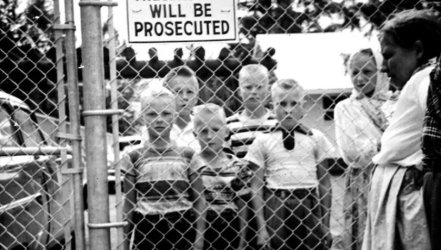
Last edited:
I had two, one a Long Branch, and sold them both. Sorry I did…….
LVSteve
Member
It does make my eyes roll when reloaders whine that a particular military cartridge is tough to reload. The military work on a "one and done" basis when it comes to ammo, except maybe gathering up range brass to be recycled. The military generally don't design ammo with reloading in mind, reliability and feeding in tough conditions are more on their mind.When Russia invaded Afghanistan the supply of cheap 303 ammo disappeared immediately. The Afgans were all familiar with the Enfields and the cartridge. The secret backers of both sides had the money and the power to buy up any surplus weapon and cartridge on the market. At the time, in the US there was also a lot of negative feelings about the .303 being a poor choice to reload because of the rimmed design and the cases stretching making reloading a 2 or 3 time case before discarding the brass. If I was going to have to select a bolt action rifle to use in combat, the Enfield MK 4 would be my first choice. 10 shots vs 5, smooth action, reasonably accurate, modern sights. The 98K has 5 shots and sights that are not very good in my opinion. How many Germans died while trying to get the clips out of the way while the Brits were still shooting?
The fix for .303 case stretching is to slide an O ring down the case so it rests against the rim. When the round is loaded, this ensures the case base is firmly contacting the bolt head, so any "stretch" is at the shoulders, ideal given the variability of Enfield chambers. Future reloads are limited to neck resizing, the only issue being is that the case is now only good for the rifle in which it was first fired.
My first Enfield was a 1916 No 1 Mk III* that I got for $90 back in late 1998. Sold it for $400 in 2018. Now down to one, a 1904 Mk I*** I got for a very reasonable $500 in 2019.
A much better fix is to eliminate any case stretching whatsoever before ever firing new unprimed brass. Then all that happens upon firing is that the case expands radially to contact the chamber walls, no stretching anywhere.The fix for .303 case stretching is to slide an O ring down the case so it rests against the rim. When the round is loaded, this ensures the case base is firmly contacting the bolt head, so any "stretch" is at the shoulders, ideal given the variability of Enfield chambers.
You do that by creating a false shoulder ahead of the factory shoulder, essentially creating the equivalent of a fire formed case without actually firing. And you now have cases for your rifle that headspace on the shoulder, not on the rim, removing any variables concerning differing rim thicknesses.
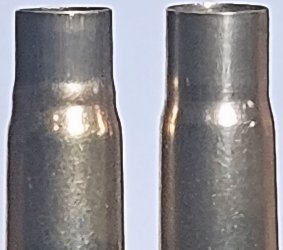
My 95L series 1950 Long Branch that still had the arsenal hang tag attached when I got it has a very short ball seat and leade (compared to most Lee Enfields) as a chamber casting shows. Look at how much further ahead on the neck the false shoulder on that modified case is when compared to an unaltered case. (best photo I could do with my phone at my bench under fluorescent lights)
The "headspace issue" for Lee Enfield rifles is with few exceptions found between the ears of unknowing American handloaders and gun writers. With SAAMI's decision that they know better than the Brits what the proper measurements are for the .303 Brit contributing as well - SAAMI dimensions for chambers, cartridges, reloading dies, headspace gauges, etc are about .005" shorter than they should be. The Go-No Go range for the .303 British is only .010" to begin with.
Everything after that first firing is neck sizing only until you get to the point where you need to bump the shoulder back a bit. I think the Lee Collet Die is best for this, but opinions may obviously differ.
This requires handloaders who have more than one rifle to segregate brass for use in each rifle.
I've found a few online the past couple a years, but don't know enough about them to really know what I'm looking at. I've always wanted one though.

